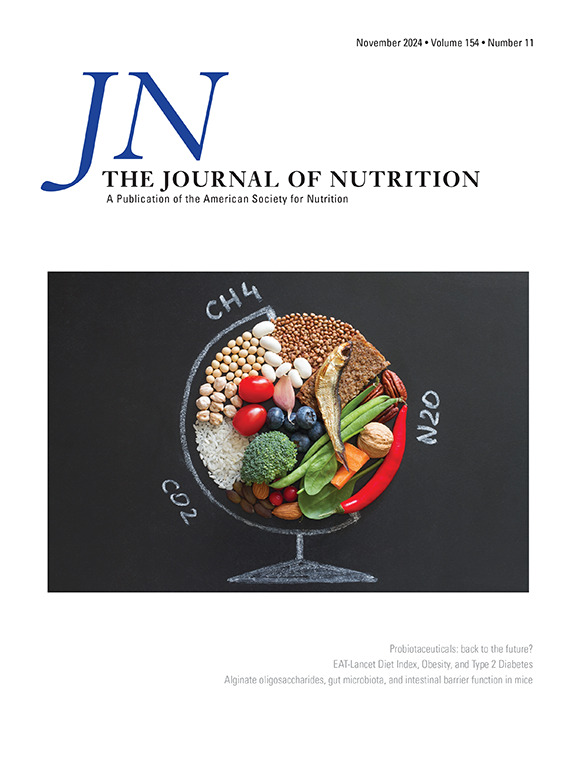在雌激素缺乏的小鼠模型中,平托豆补充调节肠道微生物群并改善肠道完整性标志物。
IF 3.8
3区 医学
Q2 NUTRITION & DIETETICS
引用次数: 0
摘要
背景:新兴研究表明,肠道菌群的变化通过调节肠道健康在绝经相关疾病中发挥关键作用。目的:研究补充平豆(PB)对雌激素缺乏小鼠肠道完整性的影响。方法:60只3 m龄雌性C57BL/6J小鼠分别注射麻油(对照品)或乙烯基环己烯二氧化二酯(VCD, 160 mg/kg) 30 d诱导雌激素缺乏。然后将小鼠随机分为两组(n=15/组):对照组(AIN-93M)或AIN-93M + 10% (wt/wt) PB,持续16周。子宫重量和血清FSH均证实卵巢功能衰竭。通过测量紧密连接蛋白、β-葡萄糖醛酸酶活性、短链脂肪酸(SCFAs)和16S微生物群组成来评估肠道健康。通过对鉴定出的多酚对ER-α和ER-β的分子对接分析,评价了PB的雌激素作用。数据采用双因素方差分析,将雌激素水平(VCD)和饮食作为影响因素,当VCD显著(PVCD< 0.05)降低相对子宫重量(~ 35%)并增加血清FSH(~ 60%)时进行事后检验,证实雌激素降低。PB恢复空肠Cldn1 (Pdiet x VCDdiet=0.010) β-葡萄糖醛酸酶活性(~ 25%)。与对照组相比,添加PB可使某些有益菌属(如双歧杆菌、拟杆菌、杜波氏菌和乳杆菌)富集,并使粪便中乙酸、丙酸、正丁酸和总短链脂肪酸增加2倍。分子对接分析表明,辛酸和阿魏酸是PB中的植物雌激素,对雌激素受体具有较高的结合亲和力。结论:补充PB可改善雌激素缺乏患者肠道微生物的多样性和完整性,为绝经相关肠道健康提供潜在益处。本文章由计算机程序翻译,如有差异,请以英文原文为准。

Pinto Bean Supplementation Modulates Gut Microbiota and Improves Markers of Gut Integrity in a Mouse Model of Estrogen Deficiency
Background
Emerging research suggests that changes in gut microbiota play a key role in menopause-related diseases by modulating gut health.
Objectives
This study investigated the effects of pinto bean (PB) supplementation on gut integrity in an estrogen-deficient mouse model.
Methods
Sixty 3-mo-old female C57BL/6J mice were injected with either sesame oil (vehicle) or vinylcyclohexene diepoxide (VCD, 160 mg/kg) for 30 d to induce estrogen deficiency. Mice were then randomly assigned to 2 dietary groups (n = 15/group): control (AIN-93M) or AIN-93M + 10% (wt/wt) PB for 16 wk. Ovarian failure was confirmed by uterine weight and serum follicle-stimulating hormone (FSH). Gut health was assessed by measuring tight junction proteins, β-glucuronidase activity, short-chain fatty acids (SCFAs), and 16S microbiota composition. PB was evaluated for its estrogenic effects by molecular docking analysis of the identified polyphenols against estrogen receptor (ER)-α and ER-β. Data were analyzed by 2-way analysis of variance, with estrogen status (VCD) and diet as factors followed by post hoc tests when significant (P < 0.05) interaction effect was observed.
Results
VCD significantly (PVCD < 0.05) reduced relative uterine weight (∼35%) and increased serum FSH (∼60%), confirming estrogen reduction. PB restored jejunal Cldn1 (Pdiet × VCD < 0.05) in VCD-treated mice and significantly increased (Pdiet=0.010) β-glucuronidase activity (∼25%). PB enriched some beneficial bacteria genera (i.e., Bifidobacterium, Bacteroides, Dubosiella, and Lactobacillus) and increased fecal acetic, propionic, n-butyric, and total SCFAs by 2-fold compared with those on the control diet. Molecular docking analysis identified sinapic and ferulic acid as phytoestrogens in PB with high binding affinity for ERs.
Conclusions
PB supplementation improves gut microbial diversity and integrity in estrogen deficiency, offering potential benefits for menopause-related gut health.
求助全文
通过发布文献求助,成功后即可免费获取论文全文。
去求助
来源期刊

Journal of Nutrition
医学-营养学
CiteScore
7.60
自引率
4.80%
发文量
260
审稿时长
39 days
期刊介绍:
The Journal of Nutrition (JN/J Nutr) publishes peer-reviewed original research papers covering all aspects of experimental nutrition in humans and other animal species; special articles such as reviews and biographies of prominent nutrition scientists; and issues, opinions, and commentaries on controversial issues in nutrition. Supplements are frequently published to provide extended discussion of topics of special interest.
 求助内容:
求助内容: 应助结果提醒方式:
应助结果提醒方式:


